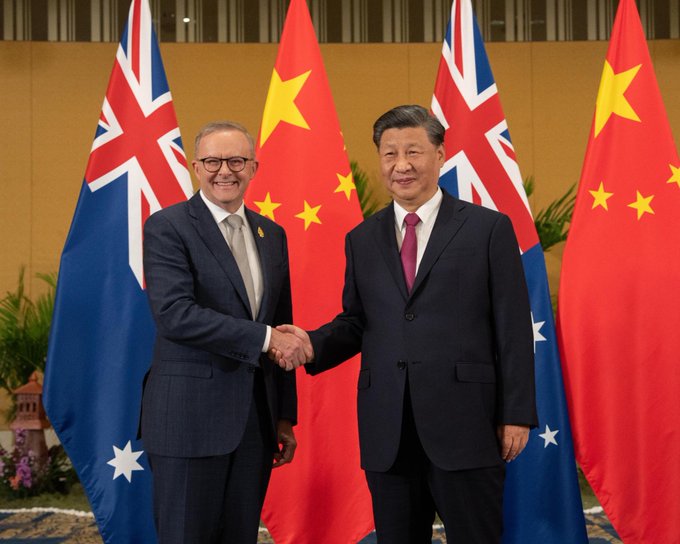Australian PM in China: A Bid to Strengthen Commercial Ties
Prime Minister Anthony Albanese of Australia undertook his second visit to China, landing in Shanghai on Saturday. The main purpose of his visit was to fortify the recently healed commercial relationships, despite the ongoing geopolitical strains. The past decade has seen a rocky path for diplomatic relations between China and Australia due to continuous disputes over national security and clashing interests in the vast Pacific region. Things started to look up in December when the punitive prohibition on imported Australian rock lobster was terminated by China, thus marking the end of a detrimental trade war which began in 2017 after diplomatic ties dipped.
In anticipation of his visit, Albanese made it clear that the trade between both nations was now unhindered, posing benefits for both countries and their businesses and people. His arrival in Shanghai was marked by a ‘very warm welcome’, as he shared with journalists. Nevertheless, this visit, scheduled to last until Friday, comes against a backdrop of regional tension, especially due to China’s broad territorial claims, specifically over the South China Sea.
The Australian premier affirmed on his arrival that a comprehensive range of concerns would be open for discussion during his meetings with Chinese leaders, including President Xi Jinping. He expressed readiness for cooperation whenever feasible and disagreement when unavoidable, whilst maintaining an open dialogue about existing disputes. Reflecting on the diverse political systems and varied values of the two nations, Albanese insisted that keeping an open line of direct engagement was essential.
The foreign ministry of Beijing voiced earlier this week that the mutual relations were on an upward trajectory. China harbors hopes that this visit can enhance communication, foster trust, and expand practical cooperation, according to ministry spokesperson Mao Ning.
The Australian Prime Minister’s tour of Shanghai, Beijing, and Chengdu comes at a critical point. ‘The trip is unlikely to be smooth sailing, particularly since Australia must cautiously manage its alliance with America and budding disagreements about trade,’ remarked Huong Le Thu, who serves as Asia deputy director at the International Crisis Group. She added that his visit should endeavor to strike a harmonious balance.
Despite an uneasy peace in trade matters, skepticism remains hard to dispel for both countries. Australia continues to express apprehension over potential national security threats from Chinese technology within its borders. In a recent development this February, it prohibited Chinese AI-powered chatbot DeepSeek from government devices, citing concerns of privacy invasion and malware risks, a move that Beijing denounced as politicization of economic, trade, and technological issues.
The end of the trade war has not led to a decrease in regional concerns, with an escalating encounter between military planes in February resulting in stern rebukes from both nations. The future of Darwin Port is another sticking point in the relationship, given it’s currently controlled by a Chinese-owned firm which could face sales pressure from Albanese’s government to a local buyer.
According to Jingdong Yuan, a China expert at the Stockholm International Peace Research Institute, China is keen to portray that its relations with Australia are back to normal, if not amicable. He suggested that Beijing would prefer the thorny Darwin Port dilemma to dissolve. Furthermore, Yuan theorizes that China might leverage harsh treatment whether dealing with allies or adversaries in order to prompt Australia to maintain a subtle distance from the United States.
Despite the overarching tensions, China holds significant value for Australia as one of its most paramount economic allies, being responsible for almost a third of its total trade. As a part of his visit, Albanese also plans to discuss matters of tourism and sport, paying visits to Shanghai, a significant economic hub, and the cultural mecca of Chengdu in the southwestern region.


